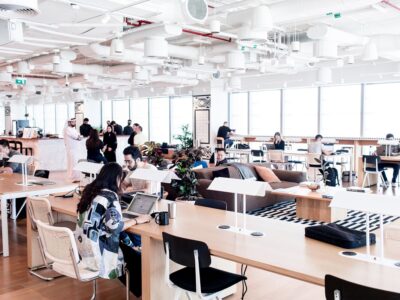From sourcing to hire, Artificial intelligence (AI) has started changing the way recruitment is done.
AI-enabled recruiting is now taking the Internet by storm. In fact, in a recent survey on the future of work, nearly nine in 10 recruiters in the UAE said that the hiring process of the future will be entirely online, move significantly faster, and be heavily reliant on artificial intelligence, automation, and human resource analytics.
Machine learning is all about predicting future events based on past actions. In this context, AI has emerged, a child of big data and predictive analytics born after years of research and data collection. Machine learning has proven an ally in the talent management process—from screening and interviewing candidates to onboarding and engaging employees.
AI makes the human-machine combination in the recruitment process more powerful than ever before. Conventionally, a recruiter serves as the middle person between the hiring manager and the candidate. AI helps manage this long and time-consuming process, smoothing the hiring pipeline and allowing a company to get more done in less time. Companies are then able to allocate more resources and spend time where it matters: building relationships with high-profile candidates and adding value to recruiting on a strategic level.
Of course, AI can never replace the all-important role of the human in the recruitment process. What AI can do, however, is understand which sources have produced the right fit, help predict the steps required to move forward, and empower HR professionals to make the best decisions.
Let’s explore the impact of AI in each step of the hiring pipeline:
1. Job Listings
The quality of your applicants often depends on the quality of the job listing. At this first phase of recruiting, AI can help the recruiter to formulate clear, detailed job descriptions that explain exactly what the organization is looking for in candidates.
AI will analyse the data about a company, like its corporate culture, hiring trends and demographics of current employees, in order to help match candidates with the right companies.
Sometimes, it is all about getting the right message to the right person at the right time. Therefore, job listings need to appear in places where they will receive maximum exposure. AI can suggest the best candidate sources for a given job based on a number of criteria, and can help make sure that your job postings get seen.
2. Talent Acquisition
More than half of the talent acquisition professionals say that the hardest part of recruitment is filtering through candidates from a large applicant pool. In fact, it sometimes seems like the primary job of recruiters is processing applications, rather than actually recruiting people. The automations AI provides can put an end to much of the manual processing recruiters have to do. AI can help identify the candidates who best fit the needs of the organization, and surface those resumes right away.
3. Candidate Screening
A recruiter spends almost 3.5 hours per day on résumé reviews and candidate screening. AI can automate many parts of this process, almost acting as a personal assistant. One of the best ways to utilize AI is through chatbots and automated message services.
By assigning rules and triggers through chatbots and automated message services, the recruiter can automate conversations related to specific hiring or job queries and receive instant answers. No more having to wait to hear back from a colleague, or sorting through reams of paper files; just ask, and AI can answer.
AI uses machine learning, so the more data it has at its disposal, the better it becomes at predicting successful outcomes. What this means is that AI will only get smarter. And when you deploy AI to help get the routine work done, you’re able to spend more time conducting HR activities that require the human touch.
4. Machines as Matchmakers
In order to make the right hire, every recruiter needs their recruitment process to function as a well-oiled machine. With more access to more relevant data than ever before, recruiters are in a fantastic position to match jobseekers with the best jobs. AI improves the odds of creating a great match from the beginning of the recruiting process by applying predictive algorithms that ensure jobseekers see the most relevant postings first.
When AI algorithms are incorporated into the company’s recruitment tool, you’ll be amazed at what they can do. Many steps in the recruitment process can be automated, everything from finding candidates, parsing résumés, sending follow-up emails, arranging interviews, evaluating assessments and collecting feedback.
5. Hire and Keep
Keeping current employees happy is just as important as getting new ones in the organization. And AI can add immense value when it comes to measuring the employee experience and building a positive company culture. According to 48% of recruiters, companies with a strong, vibrant culture attract better prospective hires. And by paying attention to details like why employees leave the company or switch departments, you’ll learn how to improve engagement and ensure employee retention. Try HR backed by AI-powered insights; you might be surprised at what you find.







